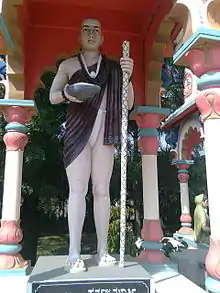Sarvajna
Sarvajña (Kannada: ಸರ್ವಜ್ಞ) was a Kannada poet, pragmatist and philosopher of the 16th century. The word "Sarvajna" in Sanskrit literally means "the all knowing". He is famous for his pithy three-lined poems called tripadi (written in the native three-line verse metre, "with three padas, a form of Vachana"). He is also referred as Sarvagna in modern translation.[1]
Sarvajña ಸರ್ವಜ್ಞ | |
|---|---|
 Statue At Kudalasangama | |
| Native name | Masur |
| Born | Early 16th Century Masur Karnataka, Rattihalli Taluk, Haveri District |
| Died | Masur, Rattihalli Taluk, Haveri District |
| Occupation | Poet, Pragmatist, Philosopher, Monk |
Early life
The period of Sarvajña's life[2] has not been determined accurately, and very little is known about his personal life. Based on studies of his literary style and the references by later writers, historians estimate that he may have lived during the first half of the 16th century. Some references in his works indicate that his real name was Pushpadatta - Sarvajña appears to have been his pseudonym. From information gleaned from his poems, historians believe that his father, a Veerashaiva-Lingayat, met his mother, named Mali in present-day Haveri district (formerly part of Dharwad district) of Karnataka state on his way to Benares while on a pilgrimage. Sarvajna upheld the wisdom of pastoral life in rural areas in his poems and tried to persuade villagers to give up superstition, meaningless customs and traditions.
Tripadis
Sarvagna grew up as a wandering monk creating Tripadis, the famous three liners. In all, about 2000 three-liners are attributed to him. Popular because of their alliterative structure and simplicity, they deal mainly with social, ethical and religious issues. A number of riddles are also attributed to Sarvajna. All his Tripadis mostly rhyme at second letter of every line.
Some examples
- Being a monk, he says how he became an omniscient in one of his tripadi.[3]
- ಸರ್ವಜ್ಞನೆಂಬುವನು ಗರ್ವದಿಂದಾದವನೇ?
- ಸರ್ವರೊಳು ಒಂದೊಂದು ನುಡಿಗಲಿತು, ವಿದ್ಯೆಯ
- ಪರ್ವತವೆ ಆದ ಸರ್ವಜ್ಞ.
- Sarvajnanembuvanu garvadindaadavane?
- Sarvarolu ondondu nudigalitu, Vidhyeya
- parvatave aada Sarvajna
- Translation : Sarvajna did not become an omniscient by his pride. However, by learning one word of wisdom from each, he became a mountain of knowledge.
ವಿದ್ಯೆಯುಳ್ಳವನ ಮುಖವು ಮುದ್ದು ಬರುವಂತ್ತಿಕ್ಕು , ವಿದ್ಯೆಯಿಲ್ಲದವನ ಬರಿ ಮುಖವು ಹಾಳೂರ ಹದ್ದಿನಂತಕ್ಕು - ಸರ್ವಜ್ಞ
Translation: A learned man has radiance glow on his face, while an illiterate face resembles that of an eagle of abandoned city - sarvanja.
ಮಾಸೂರ ಬಸವರಸ। ಕೂಸನೀಶನ ಕೇಳೆ।ಕಾಶಿಯ ಅಭವನೊಳು। ಪಡೆದ ವರವದುವೇ। ಸೂಸಿತೆಂತೆನಲು ಸರ್ವಜ್ಞ॥
- ಮೂರ್ಖಂಗೆ ಬುದ್ಧಿಯನು ನೂರ್ಕಾಲ ಹೇಳಿದರು
- ಗೋರ್ಕಲ್ಲಮೇಲೆ ಮಳೆಗರೆದರೆ, ಆಕಲ್ಲು
- ನೀರ್ಕುಡಿವುದೇ ಸರ್ವಜ್ಞ?
- Moorkhange budhiyanu noorkaala helidaru
- Gorkallamele malegaredare, aakallu
- neerukudivude Sarvajna
- Translation : Giving advice to a fool for hundred years is as useless as a heavy rain pouring on a stone. The stone never drinks the water.
- ಸಾಲವನು ಕೊಂಬಾಗ ಹಾಲೋಗರುಂಡಂತೆ
- ಸಾಲಿಗರು ಕೊಂಡು ಎಳೆವಾಗ, ಕಿಬ್ಬದಿಯ
- ಕೀಲು ಮುರಿದಂತೆ ಸರ್ವಜ್ಞ.
- Saalavanu kombaaga haalogarundante
- Saaligaru kondu elevaga, Kibbadiya
- keelu muridante Sarvajna
- Translation : While borrowing loan it feels like eating desserts. When the loan is due for payment, it feels as painful as a broken rib cage.
- ಏಳು ಕೋಟಿಯೆ ಕೋಟಿ, ಏಳು ಲಕ್ಷವೇ ಲಕ್ಷ
- ಏಳು ಸಾವಿರದ ಎಪ್ಪತ್ತು ವಚನಗಳ
- ಹೇಳಿದನು ಕೇಳ ಸರ್ವಜ್ಞ."
- Elu kotiye koti, elu lakshave laksha
- Elu saaviradha eppatthu vachanagala
- Helidanu kela Sarvajna
- Translation : "Saravajna has preached 7,07,07,070 vachanas (Tripadi) overall"
- ಮಜ್ಜಿಗೆ ಇಲ್ಲದ ಊಟ
- ಮಜ್ಜನವ ಕಾಣದಾ
- ಲಜ್ಜೆಗೆಟ್ಟ ಹೆಣ್ಣಂತೆ ಸರ್ವಜ್ಞ.
- Majjige illada oota
- Majjanava kaanada
- lajjegetta Hennanthe Sarvajna
- Translation : Dinner without butter milk (yogurt) is like a dirty woman without bath.
References
- Sources
- Medieval Indian Literature: An Anthology By K. Ayyappapanicker, Sahitya Akademi
- Gandham Appa Rao, Vemana and Sarvajña, Progressive Literature (1982).
- Anthology of Sarvajna's sayings, Kannada Sahitya Parishat (1978).
- K. B Prabhu Prasad, Sarvajna, Sahitya Akademi (1987), reprint 1994 ISBN 81-7201-404-X.
- Notes
- "ಕವಿ ಸರ್ವಜ್ಞ (Poet Sarvajna)". kanaja.in , Kanaja. Retrieved 28 September 2017.
- "Sarvagna and his vachanna". web.missouri. Retrieved 2010. Check date values in:
|access-date=(help) - Poems
External links
| Wikimedia Commons has media related to Sarvajna. |
| Wikiquote has quotations related to: Sarvajna |
- know more about sarvajna and his poems
- Sarvajna's three-liners (Kannada page)
- Sarvajna's three-liners (with English translations)
- Picture of Sarvjna's Manuscript
- Sarvajna's vachana in Kannada
- Sarvagna's Tripadi with translation, transliteration and explanation
- 200+ Collection of Sarvajna Vachanagalu(Android App)
- An app with Sarvagna Tripadis curated for application in today's world